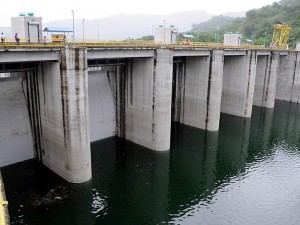
The $1.2-billion San Roque hydroelectric power plant in Pangasinan. European Chamber of Commerce of the Philippines official Henry Schumacher described the decision of the Supreme Court—which handed down a 6-6-2 decision last October on San Roque Power’s case—as “unfortunate.” INQUIRER file photo
Local and foreign business organizations have renewed their call for greater clarity and transparency in rules governing the refund of value-added tax (VAT) for investors so as not to erode the international community’s sentiment toward doing business in the country.
This came after the Supreme Court recently rejected the bid of Japanese-owned San Roque Power Corp. to recover P483 million in VAT refunds that it was eligible for when it built a $1.2-billion hydroelectric power plant in Pangasinan in the late 1990s.
In an interview, European Chamber of Commerce of the Philippines official Henry Schumacher described the decision of the high tribunal—which handed down a 6-6-2 decision last October on San Roque Power’s case—as “unfortunate.”
“The SC rejected the claim of San Roque Power to recover the excess input VAT from the [Bureau of Internal Revenue] in a split decision, unfortunately leaving the business community (and the lower courts) with unclear dates of effectivity and hurting a string of other refund seekers,” said Schumacher, who is also vice president for external affairs of the business group.
He pointed out that San Roque Power, which was built by the Marubeni group of Japan in response to the power shortage in the 1990s, came into the country “in good faith” and attracted by the incentives offered by the government.
He lamented, however, that the rules “seemed to have changed midstream” with the government now giving the Japanese businessmen a difficult time in recovering what was promised to them.
“There should be equal protection under the law,” Schumacher said. “San Roque Power Corp. is just the tip of the iceberg. There are a lot of companies out there with pending VAT refund claims.”
Under the rules, a company is given 30 days to file a VAT refund claim, while the BIR has 20 days within which to decide whether the claim is valid. A dispute arose between tax authorities and San Roque Power as to whether the eligibility period had already elapsed and, as such, the issue was brought before the courts. The Court of Tax Appeals ruled in favor of San Roque Power, but this was reversed after the BIR elevated the issue to the Supreme Court.
“Although it is accepted that the 120+30-day rule in applying for VAT refund is valid, it is obvious that—by design or otherwise—BIR was or is inconsistent regarding the question from when the 120+30day rule counts,” Schumacher said, adding that the subsequent decisions of the CTA and SC made the issue even more confusing for investors.
“When studying the VAT refund case of San Roque Power before the Supreme Court and comparing that case with many others decided by the BIR, CTA and the Supreme Court, then there is sufficient evidence that all three decided on the basis of different criteria, confusing the private sector and depriving some investors of the promised VAT refund,” he pointed out.
San Roque Power has asked the Supreme Court to allow it to file an appeal on the 6-6-2 split decision to gain greater clarity on the issue.

